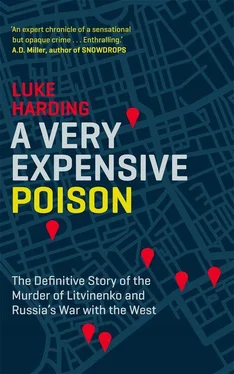Such measures were understandable. D3 had told German police he was afraid of being killed. Despite the inquiry’s best efforts, he declined to give evidence. Kovtun’s ex-wife and her mother – Marina and Eleanora Wall – refused to cooperate. Letters inviting them to turn up went unanswered.
Still, there was a wealth of material. And once the public hearings ended, the tribunal continued in secret session. Inside these closed hearings Owen examined a significant amount of classified material from the UK government and its various spy agencies including MI6, Litvinenko’s old employer.
Nobody beyond a small circle of spooks, ministers and top civil servants knows what is inside MI6’s files. Even in less sensitive cases, the agency argues that disclosure might threaten its sources. None of MI6’s records have been made public since it was founded in 1909.
Goldfarb believes the Litvinenko files contain a well-grounded conclusion that Putin is a front for organised crime and that Litvinenko was murdered because he’s key to that understanding. We can assume the documents include MI6’s Litvinenko dossier. And its internal assessment – written in 2007 – as to who may have ordered his execution.
There may also be transcripts of intercepted phone calls made by Lugovoi, Kovtun and possible unknown third parties in London, Moscow and elsewhere. And email traffic. That the UK, US and others have the ability to eavesdrop on phone calls was well known, even before the US whistleblower Edward Snowden revealed the extent of this surveillance in 2013. Officially, this power isn’t acknowledged. In addition, there may be human intelligence from agents in the field. London says covert work and the effective operation of its intelligence agencies requires secrecy.
At the heart of the inquiry were two simple questions.
The first: why was Litvinenko killed?
The second: was the Russian state responsible for his murder?
In previous hearings, Owen had indicated that there was a prima facie case against the Russian state. But did that mean that Putin – or those around him – had ordered Litvinenko’s liquidation? How much was known? What could be inferred? The judge ruled there were no grounds for saying that the British state had failed to take ‘reasonable steps’ to protect Litvinenko. In short, the UK authorities couldn’t have anticipated a Russian death squad.
Efforts were made to involve Lugovoi and Kovtun. They were invited to give evidence by video-link from Moscow. The investigative committee of the Russian Federation chose not to participate. That left four ‘core participants’: Marina and Anatoly Litvinenko; the Metropolitan Police; the UK home secretary; and the Atomic Weapons Establishment. Each had solicitors and lawyers. And access to evidence – excluding the classified stuff.
Owen was seventy years old, had been a judge for more than two decades and was a popular figure on the legal circuit. He originally came from Wales. His appearance was that of a classic member of the British ruling class – his suits conservative, his white hair neatly combed, top button never undone.
As it turned out, Owen was ‘a pretty cool judge’, in Emmerson’s words, and not as strait-laced as he seemed at first glance. ‘He handles it with masterful calm and good judgecraft. He decides as little as he has to,’ Emmerson said. ‘He’s run these proceedings impeccably. Nobody could challenge his integrity or impartiality.’
Owen had something of a puckish sense of humour. Most of the time he listened. When he did intervene in proceedings his comments could be droll; here was a playful intelligence. One witness told the inquiry that a group of powerful individuals in Russia sought to control the president. Owen responded drily: ‘Some might say the British equivalent is the establishment.’
At 10.30 a.m., the chairman began by setting out the basic facts: that Litvinenko had died on 23 November 2006 after ‘ingesting a fatal dose of the radionuclide polonium-210, a radioactive material’. His murder raised issues of the ‘utmost gravity’. It had attracted ‘worldwide interest and concern’, he said. Owen then explained why it had taken so long for the circumstances of his death to be examined – a saga of delay. He promised his inquiry would be full and independent.
Litvinenko’s death triggered many theories as to who might have murdered him. Tam, counsel to the inquiry, said all of these would be considered. For some there was considerable evidence, for others none. There were numerous versions besides the one Litvinenko himself believed – that the Russian authorities were to blame. They included: Litvinenko accidentally poisoned himself; Berezovsky killed him; British government agencies were responsible; the mafia did it.
For those of us watching from the public gallery there were early revelations. Tam set out in broad terms the evidence against Kovtun and Lugovoi. They had tried, he said, to poison Litvinenko twice, the first time unsuccessfully. Then there was the German restaurant manager D3, to whom Kovtun confessed he was carrying ‘a very expensive poison’. Since Kovtun and Lugovoi apparently had no personal grudge against Litvinenko, they were acting on orders. But whose?
Tam described the question of state responsibility as ‘multi-faceted’ and said: ‘Which elements of the Russian state might have had the motive, the resources and, quite frankly, the daring to carry out the killing of a British citizen on British soil? At what level would such an operation have been authorised? Is it possible that an operation of this nature would have been undertaken without the knowledge, without the express authorisation, of those at the highest levels?’
Furthermore, what was the motive? Did Litvinenko betray Russian secrets while allegedly working for the British and Spanish spy agencies? Or was the Ivanov report he compiled with Yuri Shvets the key to his gruesome murder?
* * *
On day one of the hearing I was just outside the courtroom when I received an email from Emmerson. There was an attachment. It was an embargoed copy of the opening speech he would deliver on behalf of Marina Litvinenko a few hours later. I read with excitement. It was gloriously trenchant. It referenced my book, Mafia State, published in 2011 after my forced exit from Russia.
The speech was an unsparing anatomy of twenty-first-century Russian power – an indictment of a criminal regime prepared to murder its enemies, as its Soviet predecessor had done, using inventive methods. And led by a president who, when stripped down, is a mafia boss straight from a Mario Puzo bestseller.
Emmerson is a formidable lawyer. He is known for championing unpopular clients, and for offending governments and the powerful. He is a founder member of the left-wing Matrix chambers. He specialises in international and domestic human rights and appears regularly before the International and European Courts of Justice, and the European Court of Human Rights. ‘I’m driven by a passion for open truth and justice,’ he told me.
In the words of Louis Blom-Cooper, a veteran lawyer of progressive views: ‘Ben is a very clever man. Highly intelligent. A very good advocate. One of the leading public lawyers.’
Close up, it was easy to see why Emmerson is regarded as one of the best courtroom performers of his generation. Whenever present, he was the tribunal’s irresistible mid-point, it struck me. There was the booming voice, of course. And the phenomenal work rate. There was a remorseless logic to his questions, too: any witness who lied or equivocated got crushed, as if by a mallet. In person, he looks a bit of a bruiser: broad shoulders, large head, black glasses, closely cropped hair.
Emmerson’s preeminent gift is that he can render a complex legal argument in compelling and intelligible phrases, a process of rapid disassembly. Journalists don’t need to think of a headline: he writes one for you.
Читать дальше












